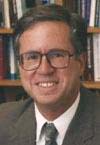|
The second fundamental break with classical physics after general
relativity came gradually over a thirty year period (1900-1930)
with the development of quantum mechanics by dozens of physicists
including Planck, Einstein, Bohr, Schrödinger, Heisenberg,
and so on. Quantum phenomenon display: wave and particle properties
as in the famous "two-slit experiment", leading
Niels Bohr to talk about "wave/particle duality"; discrete
transitions (`jumps', `tunneling') between separate states; leading
Niels Bohr to talk about "wave/particle duality"; discrete
transitions (`jumps', `tunneling') between separate states; spontaneous, random occurrences (though statistically law-abiding); spontaneous, random occurrences (though statistically law-abiding); and the famous Heisenberg uncertainty principle, in which uncertainties
occur in "conjugate" variables, such as position and
momentum. and the famous Heisenberg uncertainty principle, in which uncertainties
occur in "conjugate" variables, such as position and
momentum.
Accordingly, quantum mechanics is subject to competing interpretations
- none of which can be overruled by known data to date. The Copenhagen interpretation of Niels Bohr stressed the epistemic
limitations of quantum physics. Here one is forced to use contradictory
models, such as waves and particles, to refer to the same phenomena
in order to explain all of its aspects. Others argued for an ontological
interpretation of quantum mechanics, arguing that quantum unpredictability
points to a fundamental indeterminism in reality. Werner Heisenberg
argued this way: the chance aspects of quantum phenomena are due
to an ontological property, indeterminism, which holds at the
quantum level in the world. Albert Einstein and later David Bohm
also opted for an ontological interpretation, but they sided with
determinism, hoping that the statistical character of quantum
data could be explained by as yet unknown causal factors ("hidden
variables") or by a revised view of matter itself. Eugene
Wigner and others have suggested that it is mind acting on matter
that accounts for quantum phenomena. Everett-Graham-Wheeler adopt
a "many worlds" view, in which with every quantum phenomenon,
the universe splits into all possible states, and every possible
outcome occurs in a distinct but unobservable universe. Astonishingly,
over 60 years have passed since quantum mechanics was completed
and we still cannot decide between these interpretations based
on physical data! The Copenhagen interpretation of Niels Bohr stressed the epistemic
limitations of quantum physics. Here one is forced to use contradictory
models, such as waves and particles, to refer to the same phenomena
in order to explain all of its aspects. Others argued for an ontological
interpretation of quantum mechanics, arguing that quantum unpredictability
points to a fundamental indeterminism in reality. Werner Heisenberg
argued this way: the chance aspects of quantum phenomena are due
to an ontological property, indeterminism, which holds at the
quantum level in the world. Albert Einstein and later David Bohm
also opted for an ontological interpretation, but they sided with
determinism, hoping that the statistical character of quantum
data could be explained by as yet unknown causal factors ("hidden
variables") or by a revised view of matter itself. Eugene
Wigner and others have suggested that it is mind acting on matter
that accounts for quantum phenomena. Everett-Graham-Wheeler adopt
a "many worlds" view, in which with every quantum phenomenon,
the universe splits into all possible states, and every possible
outcome occurs in a distinct but unobservable universe. Astonishingly,
over 60 years have passed since quantum mechanics was completed
and we still cannot decide between these interpretations based
on physical data!
Email
link | Printer-friendly | Feedback
| Contributed by: Dr. Robert Russell
|







